Image
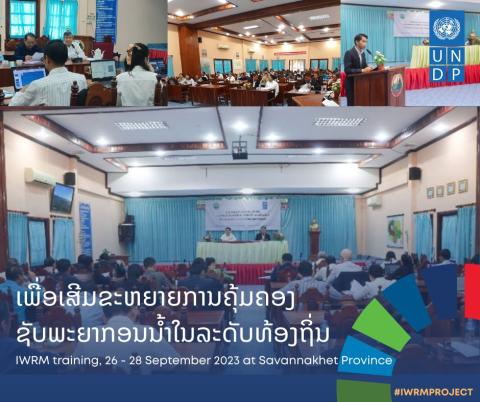
Project Number
Integrated Water Resource Management and Ecosystem-based Adaptation (EbA) in the Xe Bang Hieng River Basin and Luang Prabang City
Project Status
Status 3
Project Date
Project category
Category 3
Project Stage
Stage 3
Project Area of Work
Area of Work 3
Project Donor & Co-financing
Donor 3
Project Contact Details
For more information, please contact:
Phouphet Chittaphone
Database Management and Communication Officer IWRM-EbA Project
Email: [email protected]
Phouphet Chittaphone
Database Management and Communication Officer IWRM-EbA Project
Email: [email protected]
Share:
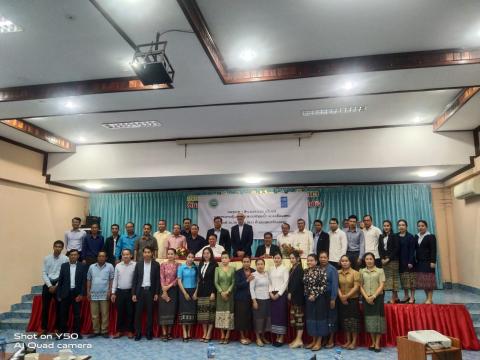
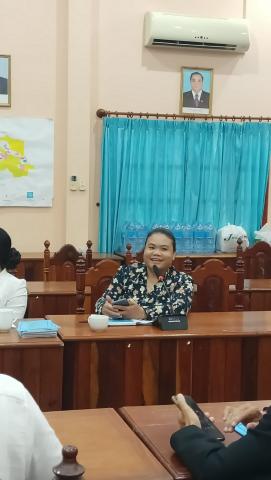
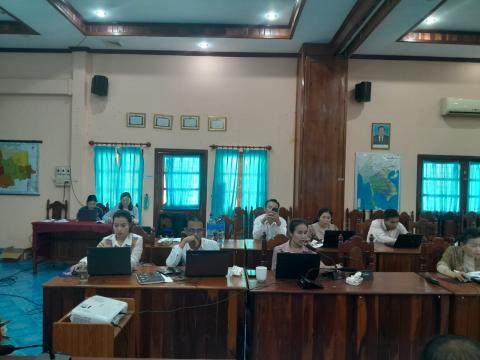
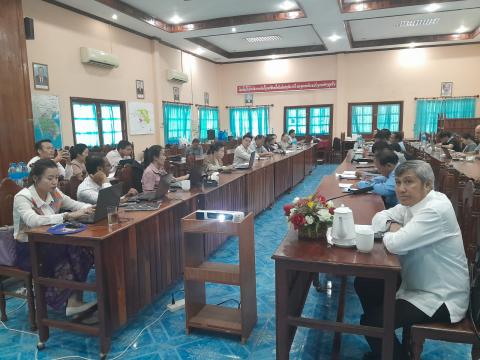
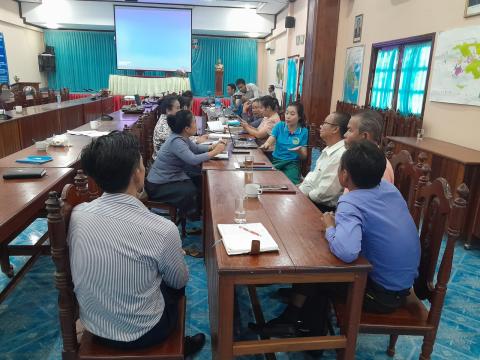
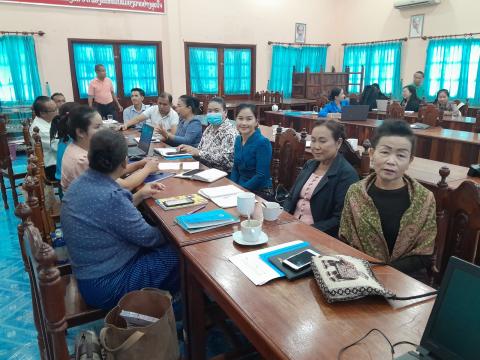
Enhancing Local Capacity in Integrated Water Resource Management: Insights from the IWRM-EbA Training in Savannakhet
Project Location
LuangPabang City and Xe Bang Hieng River Basin, Savanhnakhet Province
Project Description
The Xe Bang Hieng River Basin and Luang Prabang city in Lao PDR face significant challenges due to the impacts of climate change, which threaten the sustainability of local livelihoods, ecosystems, infrastructure, and cultural heritage. In rural areas, seasonal floods in the Xe Bang Hieng River Basin devastate agricultural lands, displace communities, and damage infrastructure. Prolonged droughts further exacerbate these issues, reducing water availability, disrupting food security, and harming local ecosystems. In urban areas, such as Luang Prabang, a UNESCO World Heritage Site, urban flooding endangers critical infrastructure, disrupts tourism, and threatens the preservation of cultural landmarks. These challenges are compounded by deforestation and rapid urbanization, which further heighten the region's vulnerability to climate impacts.
In response to these challenges, the UNDP, in collaboration with the Government of Lao PDR and supported by the Global Environment Facility (GEF), is implementing the Integrated Water Resource Management and Ecosystem-Based Adaptation (IWRM-EbA) program. This initiative aims to enhance resilience to climate-induced hazards through a combination of ecosystem restoration, community-based adaptation strategies, and improved water management practices. By integrating these components, the program seeks to strengthen the capacity of both rural and urban communities to withstand the impacts of climate change and ensure the long-term sustainability of their environments.
A key focus of the program is the restoration of ecosystems that provide essential services, such as flood regulation, water purification, and biodiversity support. Through reforestation, wetland rehabilitation, and watershed management, the program aims to restore natural buffers against extreme weather events like floods and droughts. By promoting sustainable land management practices and reducing deforestation, the program will help improve soil fertility, protect water sources, and enhance local biodiversity, which in turn will increase community resilience to climate hazards.
Another important aspect of the IWRM-EbA program is community-based adaptation. The program will empower local communities by promoting climate-smart agriculture, improving water conservation techniques, and enhancing infrastructure to withstand climate impacts. Capacity-building activities, including training and disaster risk reduction planning, will ensure that local populations are better prepared to cope with the challenges posed by climate change. This participatory approach ensures that adaptation strategies are tailored to the specific needs and vulnerabilities of each community.
Water resource management is central to the program’s success. Efforts will focus on improving the management of water resources in both rural and urban areas, with particular attention to the Xe Bang Hieng River Basin and Luang Prabang city. The program will support the rehabilitation of irrigation systems, construction of flood control infrastructure, and implementation of sustainable water management practices to improve water availability and quality. Additionally, strengthening water governance at the local and national levels will help ensure more equitable and effective water management, fostering collaboration among key stakeholders.
In Luang Prabang, the program will specifically address the risks associated with urban flooding. This includes upgrading the city's drainage systems, implementing flood control measures, and ensuring the protection of critical infrastructure and cultural heritage sites. By enhancing the city's resilience to flooding, the program will not only protect vital services but also safeguard Luang Prabang’s cultural and historical significance, which is essential to its tourism-driven economy. Through these combined efforts, the IWRM-EbA program will build a more resilient future for both the rural communities in the Xe Bang Hieng River Basin and the urban population of Luang Prabang, fostering long-term climate adaptation and sustainable development.
In response to these challenges, the UNDP, in collaboration with the Government of Lao PDR and supported by the Global Environment Facility (GEF), is implementing the Integrated Water Resource Management and Ecosystem-Based Adaptation (IWRM-EbA) program. This initiative aims to enhance resilience to climate-induced hazards through a combination of ecosystem restoration, community-based adaptation strategies, and improved water management practices. By integrating these components, the program seeks to strengthen the capacity of both rural and urban communities to withstand the impacts of climate change and ensure the long-term sustainability of their environments.
A key focus of the program is the restoration of ecosystems that provide essential services, such as flood regulation, water purification, and biodiversity support. Through reforestation, wetland rehabilitation, and watershed management, the program aims to restore natural buffers against extreme weather events like floods and droughts. By promoting sustainable land management practices and reducing deforestation, the program will help improve soil fertility, protect water sources, and enhance local biodiversity, which in turn will increase community resilience to climate hazards.
Another important aspect of the IWRM-EbA program is community-based adaptation. The program will empower local communities by promoting climate-smart agriculture, improving water conservation techniques, and enhancing infrastructure to withstand climate impacts. Capacity-building activities, including training and disaster risk reduction planning, will ensure that local populations are better prepared to cope with the challenges posed by climate change. This participatory approach ensures that adaptation strategies are tailored to the specific needs and vulnerabilities of each community.
Water resource management is central to the program’s success. Efforts will focus on improving the management of water resources in both rural and urban areas, with particular attention to the Xe Bang Hieng River Basin and Luang Prabang city. The program will support the rehabilitation of irrigation systems, construction of flood control infrastructure, and implementation of sustainable water management practices to improve water availability and quality. Additionally, strengthening water governance at the local and national levels will help ensure more equitable and effective water management, fostering collaboration among key stakeholders.
In Luang Prabang, the program will specifically address the risks associated with urban flooding. This includes upgrading the city's drainage systems, implementing flood control measures, and ensuring the protection of critical infrastructure and cultural heritage sites. By enhancing the city's resilience to flooding, the program will not only protect vital services but also safeguard Luang Prabang’s cultural and historical significance, which is essential to its tourism-driven economy. Through these combined efforts, the IWRM-EbA program will build a more resilient future for both the rural communities in the Xe Bang Hieng River Basin and the urban population of Luang Prabang, fostering long-term climate adaptation and sustainable development.
Project Outcomes & Impacts
The IWRM-EbA project training event conducted in Savannakhet Province from September 25 to 28, 2023, produced significant outcomes and impacts that are poised to enhance water resource management across Laos. By bringing together 57 participants, including a commendable representation of 23 women, the training provided critical insights into water resource legislation, the national Water and Water Resources Management Strategy, and effective river basin management practices.
One of the key outcomes of the training was the development of a shared understanding among local authorities regarding integrated water resource management (IWRM) principles. Participants engaged in dynamic discussions that facilitated the exchange of best practices and experiences between central and local government officials. This collaborative atmosphere not only strengthened intergovernmental relationships but also fostered a sense of collective responsibility for sustainable water management.
Moreover, the knowledge gained during this training is expected to inform future policy development, ensuring that it is grounded in practical insights and local realities. By enhancing the capacity of local authorities to implement IWRM strategies, the project aims to improve resilience against climate change impacts, particularly in vulnerable regions like the Xe Bang Hieng River Basin.
Overall, the training event represents a significant step toward empowering local governments with the tools and knowledge necessary for effective water resource governance. The anticipated long-term impact includes improved sustainability of water resources, better preparedness for climate-related challenges, and enhanced community engagement in water management initiatives, ultimately contributing to the well-being of local populations and ecosystems alike.
One of the key outcomes of the training was the development of a shared understanding among local authorities regarding integrated water resource management (IWRM) principles. Participants engaged in dynamic discussions that facilitated the exchange of best practices and experiences between central and local government officials. This collaborative atmosphere not only strengthened intergovernmental relationships but also fostered a sense of collective responsibility for sustainable water management.
Moreover, the knowledge gained during this training is expected to inform future policy development, ensuring that it is grounded in practical insights and local realities. By enhancing the capacity of local authorities to implement IWRM strategies, the project aims to improve resilience against climate change impacts, particularly in vulnerable regions like the Xe Bang Hieng River Basin.
Overall, the training event represents a significant step toward empowering local governments with the tools and knowledge necessary for effective water resource governance. The anticipated long-term impact includes improved sustainability of water resources, better preparedness for climate-related challenges, and enhanced community engagement in water management initiatives, ultimately contributing to the well-being of local populations and ecosystems alike.
Project Media & Reports
Image

Image

Image

Image

Image

Image

